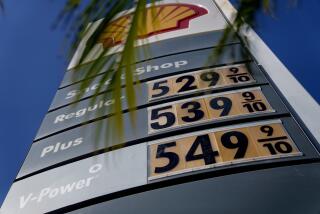Airlines kick off 2008 with new fare increases, blaming fuel as culprit
As if on cue, airlines are responding to oil’slatest surge by pushing ticket prices even higher.
Roundtrip domestic fares began rising $10 to $20 late Thursday,as crude futures crossed the once-unthinkable $100-a-barrel mark.Several major carriers increased prices, with each citing higherfuel costs as the reason.
The widespread increases follow nearly two dozen attemptedsystemwide fare hikes in 2007, or about double the number duringthe previous year, according to data compiled by FareCompare.com,which tracks airfare changes.
Passengers hoping for relief in the new year are likely to bedisappointed.
“If oil stays at $100 a barrel, or if it creeps up even higher,I don’t see how this is going to stop,” FareCompare ChiefExecutive Rick Seaney said in an interview. “Airlines are going tobe scrapping to keep their heads above water.”
United Airlines, the second-largest U.S. carrier, led with thebiggest round of increases Thursday night.
Tickets on short flights will cost $5 more one-way, while tripsof more than 1,500 miles _ such as Chicago to Las Vegas or Bostonto Denver _ will cost travelers $10 more one-way, spokeswoman RobinUrbanski said.
Delta Air Lines Inc. and AMR Corp.’s American Airlines followedUnited’s lead, matching the increase Friday.
Days before Christmas, UAL Corp.’s United doubled a $5 fuelsurcharge it added a month earlier, effectively raising round-tripfares by $10. Urbanski said that surcharge remains in place inmarkets where it was matched by competitors.
Urbanski acknowledged fares in and out of some cities are higherthan they used to be, but “are still relatively lower than a fewyears ago given that fuel is our highest expense.”
Air Canada raised prices on tickets between the U.S. and Canadaby 2 percent, according to spokesman John Reber. That means aticket booked on Travelocity.com to fly between New York andVancouver this Sunday and return Monday would cost about $30 extra.
Separately, AirTran Holdings Inc. doubled its one-way fuelsurcharge to $10, spokeswoman Judy Graham-Weaver said. FareComparedata indicated Midwest Airlines has also added a surcharge thisweek, raising round-trip ticket prices by $10, but a spokesman forthe carrier declined to comment on the matter.
“We all are facing ever increasing fuel costs and trying tokeep up,” AirTran’s Graham-Weaver said.
The increases come as crude prices hover near all-time highs. OnFriday, light, sweet crude for February delivery fell $1.27 to$97.91 to settle a barrel on the New York Mercantile Exchange.
The Air Transport Association said higher fuel costs will likelylimit U.S. airlines’ profits to between $3.5 billion and $4.5billion this year, down from an estimate of $5 billion last year.
“Rising oil prices have a disproportionately negative impact onU.S. carriers, since oil is traded in dollars,” ATA ChiefEconomist John Heimlich wrote in an e-mail. “Foreign carriersgenerally have more robust hedge positions than U.S. carriers,leaving them less exposed to the soaring oil prices.”
JPMorgan airline analyst Jamie Baker said the latest increasesaren’t much of a surprise. He estimates that every $10 increase inthe price of a barrel of oil means airlines need to generate anadditional $18 in revenue from each passenger they fly.
From the beginning to the end of 2007, crude prices surged bynearly $35 a barrel.
In response, carriers tried to raise fares 23 times last year,according to FareCompare. Of those increases, 17 were matched bycompetitors and remained in place for more than a week.
Fierce competition from low-cost carriers means the increasesdon’t often stick in popular markets such as Orlando, Fla. orWashington, D.C. But travelers in smaller cities such as LittleRock, Ark., or those with little competition, such as Salt LakeCity and Cincinnati, end up paying the most as prices increase,Seaney said.
“The bottom line for consumers is this: They’d better beshopping earlier than they used to because there’s not going to beany last minute deals left,” Seaney said. “The airlines knowexactly when travelers want to travel, and they’re going to chargea premium for that.”
More to Read
Sign up for The Wild
We’ll help you find the best places to hike, bike and run, as well as the perfect silent spots for meditation and yoga.
You may occasionally receive promotional content from the Los Angeles Times.






